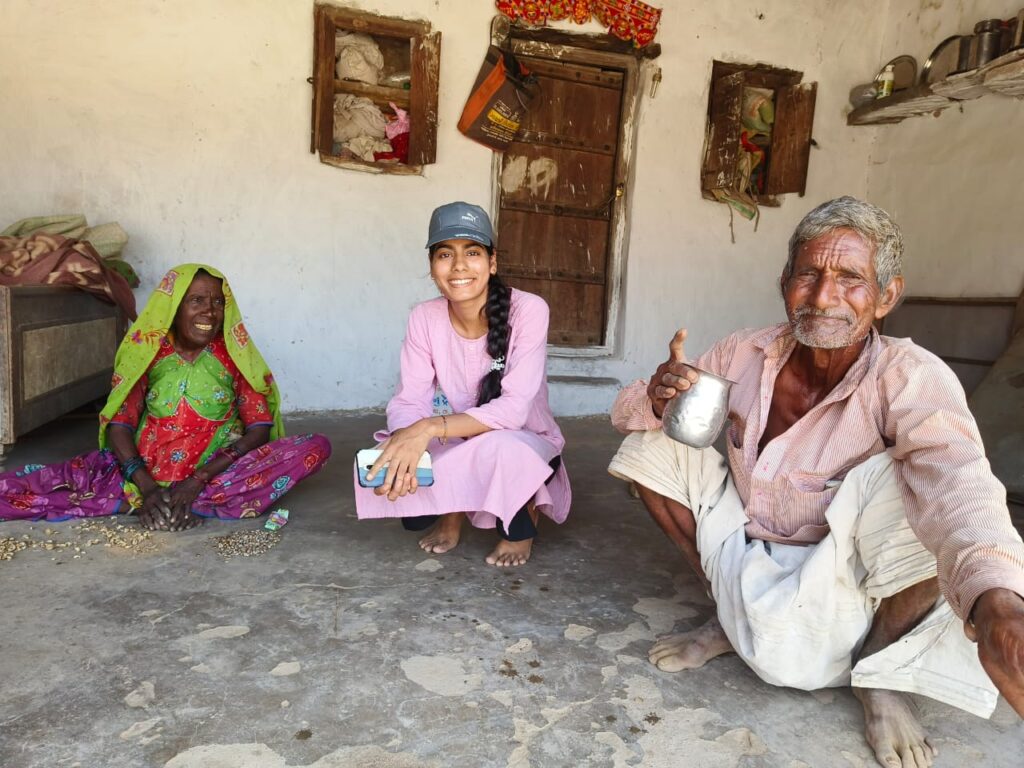“Come, come, sit under the tree. Yes, it’s scorching hot anyways. Shall I make tea for you? Or would you prefer milk? You can have either, just don’t ask for water because we don’t have it.” I was with Malu Baba and his wife in their house.
Upon hearing this, I couldn’t quite grasp the situation. My mind started pondering, and numerous questions arose. What did they mean there’s no water? How were they surviving, and what about their animals? There was a lot to learn, so let’s go to a place that perhaps only a few people know about.
A Settlement In The Desert Without Water
Fifty kilometers away from the India-Pakistan border, near the shores of the desert of Kutch, lies a small settlement called Malu Vandh. Malu Baba, more than 75 years old, resides here as the eldest among the families. He has five children, and 17 families inhabit this area, surviving in shelters that might collapse at any moment. He and his wife have a few goats and sheep. Their house is covered with dry leaves and torn clothes.
Everything essential, from electricity to transportation to the market for daily living, is absent here. But one thing is missing above all else – water. People walk nearly 8 kilometers to fetch it, a journey made more difficult in the rainy season due to flooding. Despite these hardships, they remain determined, striving to make things better by constructing ponds or engaging in agriculture.

The land in this region is arid. People’s way of life might seem unusual to many, but what we can learn from them is optimum utilisation of resources. I realised that since I can easily access water, I don’t value it as much as the people in Malu Vandh do.
A Village Unites
The organization I work with, Gram Swaraj Sangh, discovered this village while working in a nearby village, and decided to address the problems by constructing two ponds for drinking and irrigation. They insisted that the villagers contribute, whether through money or labour. With everyone happily on board, the construction began with a sense of unity that not only sped up the process but strengthened the bond between the villagers and the organization.

While the organization helped with raw materials and supervision, the people irrespective of age or gender, built it with enthusiasm and dedication. They gained a confidence in working together to overcome obstacles.
A Race Against Time
The work on the ponds began in speed, to ensure that they get ready before the rainy season. Everyone’s participation made it possible to complete it within 4 months. Meanwhile, news about Biparjoy cyclone arrived, and everyone got worried about the potential destruction it could cause. It did uproot trees, destroyed make-shift homes and brought down electricity poles.
Also read: Finding Joy Amidst Chaos Of The Cyclone Biparjoy
However, amidst all these losses, there was also a silver lining – rain. The two newly built ponds filled quickly, turning scarcity into abundance. It not only gave a regular supply of drinking water but also opened up new possibilities for agriculture.

Lessons Learned
The arrival of rain brought immense joy to the village. No longer did they have to undertake the arduous journey to fetch water from distant places. The success story of Malu vandh holds valuable lessons about the power of unity, determination, and community-driven efforts. The ponds not only quenched their thirst but also brought a change in their outlook towards life and inspired further action in preserving water and adopting sustainable practices.
The story of Malu vandh teaches us to be grateful for our resources and mindful in preserving them. It reminds us that even the smallest actions can have profound impacts. A tale of resilience, cooperation, and triumph can inspire us all.




This story seems similar to that of the movie Swades. In the movie, Mohan brings electricity with the help of the villagers and here Gram Swaraj Sangh has acted as a catalyst in introducing drinking water. Amazing stuff Falak!!!
The ripples of a good intervention are felt years after its inception. Isn’t that right?